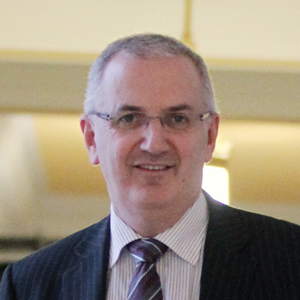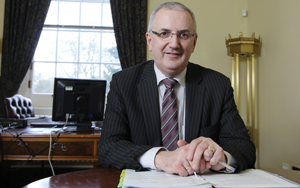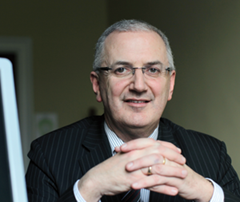Finding smarter solutions: Danny Kennedy interview
 Regional Development Minister Danny Kennedy speaks to Meadhbh Monahan about the future of roads, rail and ports policy in Northern Ireland.
Regional Development Minister Danny Kennedy speaks to Meadhbh Monahan about the future of roads, rail and ports policy in Northern Ireland.
Finding “smarter and improved ways of getting solutions to problems” is a priority for Regional Development Minister Danny Kennedy, who took up the Ulster Unionist Party’s only ministry in May.
Kennedy has £1.6 billion to invest in capital projects between 2012 and 2015. However, the Department for Regional Development has to make £160.9 million of current expenditure savings by 2014-2015 e.g. through cuts to maintenance, spending on technical advisors and subsidies to Translink, and increased car park charges.
“Obviously there are challenges, not least the economic downturn and reduced budgets,” the Minister says. His priority is to “try to operate within that wider framework [and to] successfully bring forward smarter and improved ways of getting solutions to problems.”
Two sections of the A5 Western Transport Corridor, the A8 Larne to Belfast dual carriageway and the A2 Greenisland dual carriageway are to go ahead, funded by the £583 million shortfall as a result of the decision to withdraw funding from the entire A5 project. The Minister mentions that the A26 Glarryford to A44 Drones road and upgrading the Derry to Coleraine rail line are the other main transport projects to begin by 2015. The A6 Randalstown to Castledawson road, the York Street flyover and the Sydenham bypass widening have been put on hold due to the 40 per cent cut to the block grant.
The Minister previously said that most of his roads budget (£1.1 billion) will go on the A5 and A8 and that decisions on which schemes will begin in 2014-2015 will be dependent on the funding made available beyond the current Budget period. He tells agendaNi that he intends to “bring forward as many projects as possible so that, if we can get them onto the starting grid, when the finance is available, we are in a better position to carry them out.”
Kennedy recognises that improving transport infrastructure in Northern Ireland will create opportunities for better travel which will benefit business. “Regional development is one of the key portfolios, particularly on the basis that the economy is the key priority for the Executive and recharging and reigniting the economy are very much part of that,” he remarks.
Kennedy admits that the Irish Government’s decision to reduce its commitment to the A5 from Derry to Aughnacloy from £400 million to £42 million (€50 million in 2014-2015) is “a setback”.
However, he insists: “As Roads Minister, I am interested in upgrading the strategic infrastructure of the roads network all over the province as quickly as possible and will seek to spend as much money on roads as I can.” DRD is “working through” this and are “in consultation” with the Irish Government.
When asked about the future of roads and public transport in the west of the province generally, Kennedy points to the A4 Dungannon bypass and dual carriageway at the Ballygawley roundabout (completed during the Assembly’s last term) which has “significantly opened up the west.” He continues: “There are projects that we are seeking to take forward in terms of the A5 project (including the Omagh and Strabane bypasses) and likewise on the A6 (including the Dungiven bypass) and the A26.” He is “conscious that each area and all local representatives will be battling strongly for their particular projects.”
Rail
Alliance’s Transport Spokesman Stewart Dickson has called for more ambitious transport infrastructure, in particular, a railway line to Belfast International Airport and a railway stop at the City of Derry airport. Back in 1997, the UUP’s 1997 Westminster manifesto called for a Belfast area light railway connection for the city and international airports. “In terms of the UUP, that’s quite a distance,” Kennedy laughs. However, he admits that rail access to the airports is “desirable,” but “there is no automatic, simple solution.” With a limited budget, Kennedy has been liaising with officials on the trans-European transport network to explore ways of improving road and rail infrastructure in the province. “We want to see if there are opportunities over there to perhaps avail of expertise as well as finance as to how we move this on,” he explains.
At these meetings, the Minister has told officials that European infrastructure plans cannot be directly translated into Northern Ireland. “We are on a periphery of Europe so there are regional issues that we have to adjust to rather than, for example, the high speed European network that, frankly, won’t translate to us in Northern Ireland or even cross-border,” Kennedy says.
Improving the existing Belfast to Dublin railway line is a priority. “Simply, there is no real opportunity to create a high speed rail network between Belfast and Dublin because of the distance and because of the network that already exists with stations at Lisburn and Portadown,” he notes. Instead, “we’d like to improve the Enterprise service by making it an hourly service [which] would benefit the travellers.”
Ports
Belfast, Londonderry, Warrenpoint and Coleraine ports are public trust ports while Larne port is owned by P&O. The Executive wants Belfast port to pay it £20 million per annum in 2012-2013 and 2013-2014. Belfast Harbour Commissioner’s Chairman Len O’Hagan has said that this would require a change in legislation across the UK. In his Budget speech in March, Sammy Wilson announced that the Executive intends to “maximise the value of the port to the broader strategic interests of Northern Ireland”, meaning that Kennedy is now tasked with implementing the necessary legislative changes required.
Kennedy reveals that he will soon be in a position to reveal his plans. Tellingly, he remarks: “It will potentially bring changes to the operation of the port. We are in for interesting times ahead.”
When asked if this will include privatisation, the Minister replies: “I don’t have an ideological block in terms of privatisation, or indeed the potential awarding of concessions at the port, but I think we would have to carefully think through and follow through on any recommendations. It certainly wouldn’t be anything that we’d rush into.” He sums up: “There is currently a requirement in my budget to take £40 million from the port in the last two years and I have to seek and explore ways in which that can be achieved.”
Governance at NI Water is on Kennedy’s radar as the legislation outlining how it is currently structured is due to run out in 2013.
The department currently pays an annual subsidy to NI Water on behalf of customers due to the Executive’s decision to defer separate household water charges. The Water and Sewerage Services (Amendment) Act (Northern Ireland) 2010, which legislates for that subsidy, is due to expire on 31 March.
Given that “the Executive has confirmed its unanimous view that there will be no new water charges applied in the course of this mandate,” Kennedy wants to “initiate a mature and sensible debate as to how best we can operate, or allow NI Water to operate in the future.”
Water and sewerage services have been allocated £667.9 million capital funding which is to be spent on water mains rehabilitation, new trunk mains, sewer maintenance, waste water treatment improvements and addressing sewage discharge.
When asked how he makes a ministerial decision, Kennedy explains that “there are political issues that a party will want to carry through such as the decision on on-street parking charges.”
He adds that that decision was not “conjured up as an early present for the new Minister” but involved the reconfiguration of budgets and reassessment of financial commitments.
“That’s why the work of government is not instantaneous,” he comments. “It does require careful assessment and making decisions that are not foolish and are not seen as extravagant.”
He tries to be “a listening Minister” and believes this was reflected in his decisions to proceed with the upgrade of the Coleraine to Derry railway link and “to help small businesses and traders all over Northern Ireland by deferring car parking charges and easing the pressure in the run-up to Christmas in places like Lisburn and Newry.”
When asked what motivates him, Kennedy, who finds it “a huge privilege and honour” to serve as a Minister, concludes: “The opportunity to serve and to make a difference. It’s a fascinating time to be in government and a fascinating opportunity to try to bring positive change.”







